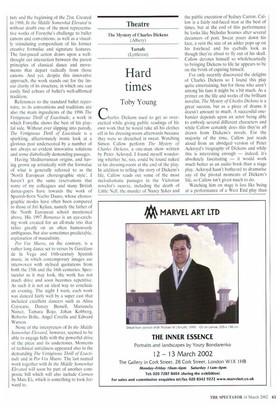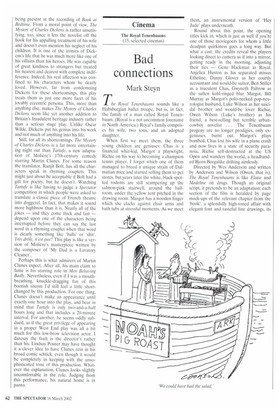Theatre
The Mystery of Charles Dickens (Albery) Tartufe (Lyttleton)
Hard times
Toby Young
Charles Dickens used to get so overexcited while giving public readings of his own work that he would take all his clothes off in his dressing-room afterwards because they were so drenched in sweat. Watching Simon Callow perform The Mystery of Charles Dickens, a one-man show written by Peter Ackroyd, I found myself wondering whether he, too, could be found naked in his dressing-room at the end of the play. In addition to telling the story of Dickens's life, Callow reads out some of the most melodramatic passages in the Victorian novelist's oeuvre, including the death of Little Nell, the murder of Nancy Sykes and
the public execution of Sydney Carton, Callow is a fairly red-faced man at the best of times, but at the end of this performance he looks like Nicholas Soames after several decanters of port. Sweat pours down his face, a vein the size of an adder pops up on his forehead and his eyeballs look as though they're about to fly out of his skull. Callow devotes himself so wholeheartedly to bringing Dickens to life he appears to be on the brink of expiring himself.
I've only recently discovered the delights of Charles Dickens so I found this play quite entertaining, but for those who aren't among his fans it might be a bit much. As a primer on the life and works of the brilliant novelist, The Mystery of Charles Dickens is a great success, but as a piece of drama it doesn't amount to much. A successful onehander depends upon an actor being able to embody several different characters and while Callow certainly does this they're all drawn from Dickens's novels. For the majority of the time, Callow just reads aloud from an abridged version of Peter Ackroyd's biography of Dickens and while this is interesting enough — indeed, it's absolutely fascinating — it would work much better as an audio book than a stage play. Ackroyd hasn't bothered to dramatise any of the pivotal moments of Dickens's life, so Callow isn't given much to do.
Watching him on stage is less like being at a performance of a West End play than being present at the recording of Book at Bedtime. From a moral point of view, The Mystery of Charles Dickens is rather unsatisfying, too, since it lets the novelist off the hook for his appalling treatment of his wife and doesn't even mention his neglect of his children. It is one of the ironies of Dickens's life that he was much more like one of his villains than his heroes. He was capable of great kindness to strangers but treated his nearest and dearest with complete indifference. Indeed, his real affection was confined to his characters whom he dearly loved. However, far from condemning Dickens for these shortcomings, this play treats them as just one more facet of his lovably eccentric persona. This, more than anything else, makes The Mystery of Charles Dickens seem like yet another addition to Britain's fraudulent heritage industry rather than a serious stage play. Unlike Oscar Wilde, Dickens put his genius into his work and not much of anything into his life.
Still, for all its shortcomings, The Mystery of Charles Dickens is a far more entertaining night out than Tartufe, a new adaptation of Moliere's 17th-century comedy starring Martin Clunes. For some reason the translator, Ranjit Bolt, has all the characters speak in rhyming couplets. This might just about be acceptable if Bolt had a gift for poetry, but he doesn't. Watching Tartufe is like having to judge a Spectator competition in which people were asked to translate a classic piece of French theatre into doggerel. In fact, that makes it sound more highbrow than it is. Nearly all of the jokes — and they come thick and fast — depend upon one of the characters being interrupted before they can say the last word in a rhyming couplet when that word is clearly something like 'balls' or 'shit'. Tres drole, n'est pas? This play is like a version of Moliere's masterpiece written by the composer of 'My Dad is a Lavatory Cleaner'.
Perhaps this is what admirers of Martin Clunes expect. After all, his main claim to fame is his starring role in Men Behaving Badly. Nevertheless, even if I was a mouthbreathing, knuckle-dragging fan of this boorish sitcom I'd still feel a little shortchanged by this production. For one thing, Clunes doesn't make an appearance until exactly one hour into the play, and bear in mind that Tartufe is only two-and-a-half hours long and that includes a 20-minute interval. For another. he seems oddly subdued, as if the great privilege of appearing in a proper West End play was all a bit much for this low-brow television actor. I daresay the fault is the director's rather than his. Lindsay Posner may have thought it a clever idea to have Clunes rein in his broad comic schtick, even though it would be completely in keeping with the unsophisticated tone of this production. Whatever the explanation, Clunes looks slightly uncomfortable in the role. Judging from this performance, his natural home is in panto.

















































































 Previous page
Previous page